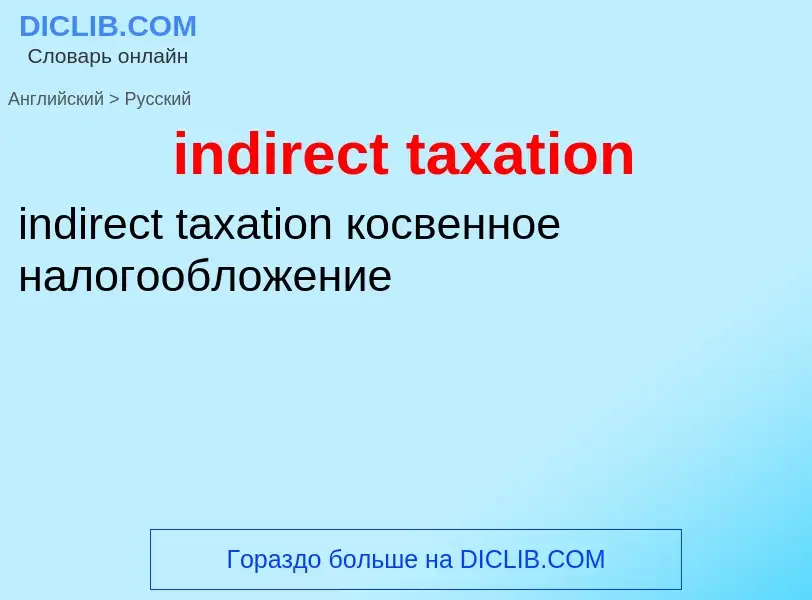Vertaling en analyse van woorden door kunstmatige intelligentie ChatGPT
Op deze pagina kunt u een gedetailleerde analyse krijgen van een woord of zin, geproduceerd met behulp van de beste kunstmatige intelligentietechnologie tot nu toe:
- hoe het woord wordt gebruikt
- gebruiksfrequentie
- het wordt vaker gebruikt in mondelinge of schriftelijke toespraken
- opties voor woordvertaling
- Gebruiksvoorbeelden (meerdere zinnen met vertaling)
- etymologie
indirect tax - vertaling naar Engels
общая лексика
косвенное налогообложение
Definitie
Wikipedia

An indirect tax (such as sales tax, per unit tax, value added tax (VAT), or goods and services tax (GST), excise, consumption tax, tariff) is a tax that is levied upon goods and services before they reach the customer who ultimately pays the indirect tax as a part of market price of the good or service purchased. Alternatively, if the entity who pays taxes to the tax collecting authority does not suffer a corresponding reduction in income, i.e., impact and tax incidence are not on the same entity meaning that tax can be shifted or passed on, then the tax is indirect.
An indirect tax is collected by an intermediary (such as a retail store) from the person (such as the consumer) who pays the tax included in the price of a purchased good. The intermediary later files a tax return and forwards the tax proceeds to government with the return. In this sense, the term indirect tax is contrasted with a direct tax, which is collected directly by government from the persons (legal or natural) on whom it is imposed. Some commentators have argued that "a direct tax is one that cannot be charged by the taxpayer to someone else, whereas an indirect tax can be."
Indirect taxes constitute a significant proportion of total tax revenue raised by the government. Data published by OECD show that the average indirect tax share of total tax revenue for all member countries in 2018 was 32.7% with standard deviation 7.9%. The member country with the highest share was Chile with 53.2% and at the other end was USA with 17.6%. The general trend in direct vs indirect tax ratio in total tax revenue over past decades in developed countries shows an increase in direct tax share of total tax revenue. Although this trend is also observed in developing countries, the trend is less pronounced there than in developed countries.
Indirect taxes have several uses, the most prominent one (same as for direct taxes) is to raise government revenue. Sales tax and value added tax (VAT) play the major role in this, with VAT being more commonly used around the world. The distinction between these two taxes is that sales tax is paid by the customer at the moment of purchase of the final good or service, whereas VAT is a multistage tax imposed on goods and services that is collected in parts at each stage of production and distribution of goods and services in proportion to the value added by each taxpaying entity.
Apart from the role in raising government revenue, indirect taxes, in the form of tariffs and import duties, are also used to regulate quantity of imports and exports flowing in and out of the country. In case of imports, by tariff imposition the government protects domestic producers from foreign producers that may have lower production costs, and thus are able to sell their goods and services at lower prices, driving domestic producers out of the market. After tariff imposition, imported goods become more expensive for domestic consumers, hence domestic producers are better-off than before tariff imposition.
Furthermore, indirect taxes in the form of excise taxes are used to reduce the consumption of goods and services that create negative externalities. For instance, an excise tax imposed on a pack of cigarettes increases the price of cigarettes, which leads to decreased consumption of cigarettes, which leads to the reduction of health conditions caused by smoking and second-hand smoking. Moreover, the tax discourages the youth from taking up smoking as they have quite elastic price elasticity of cigarette demand.
The concept of Value Added Tax (VAT) as an indirect tax was the brainchild of a German industrialist, Dr. Wilhelm von Siemens in 1918. A hundred years later, the tax which was devised to be efficient and relatively simple to collect and enforce is, together with Goods and Services Tax (GST), now in place in over 140 countries globally.



